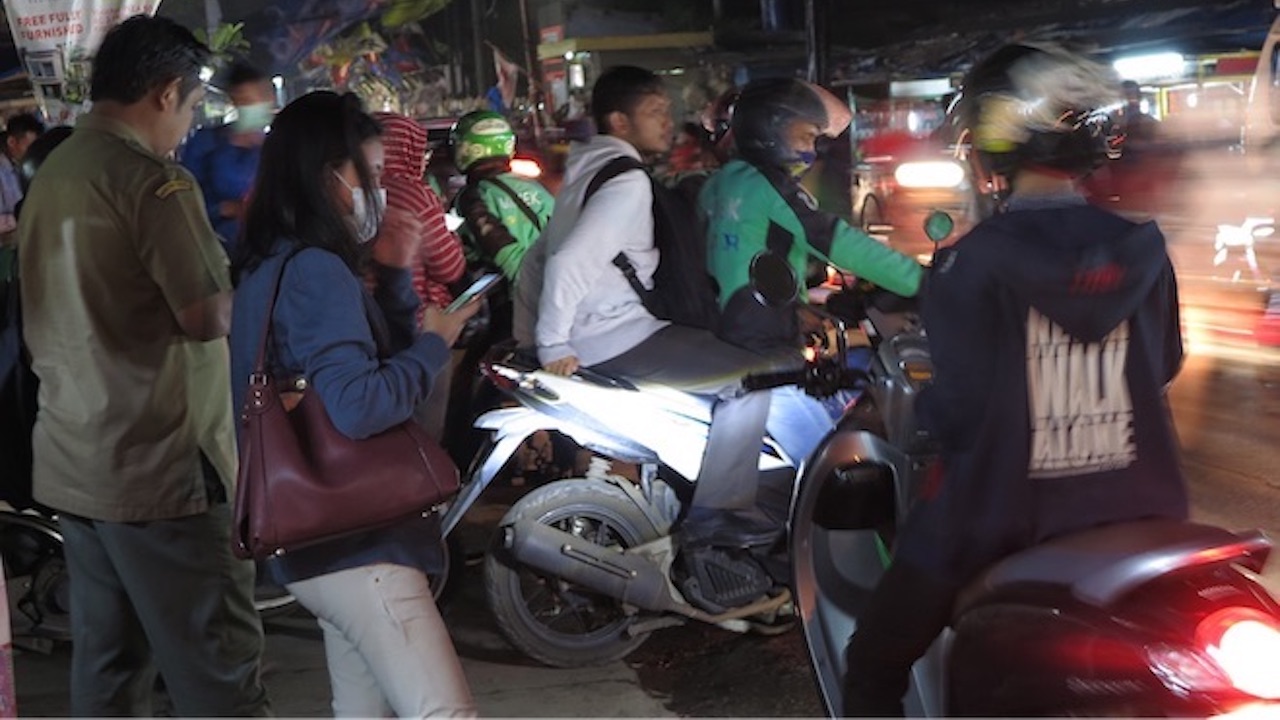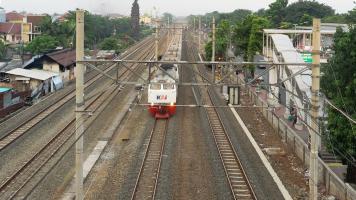
Commuting at night for women does not need to be risky. Photo credit: Pulse Lab Jakarta.
UN-led research finds that bus stops need to be part of a broader public safety ecosystem—instead of being merely physical, pick-up points.
This article is published in collaboration with Pulse Lab Jakarta.
Women who work odd hours and commute between their home or workplace using public transport at night face heightened risks. These nighttime commutes can be one of the most stressful parts of their day.
A 2019 research on nighttime female commuters in Medan, Indonesia provides a better understanding of women’s experiences, and measures that can keep them safer.
While there has been research on women’s safety in public places, due attention has not been given to those who work night shifts in the small retail sector and rely on public transport to travel after dark.
The research was conducted in Medan in November 2019 by UN Women and Pulse Lab Jakarta, a joint data innovation facility of the United Nations (Global Pulse) and the Government of Indonesia.
Called After Dark, the research harkened to the findings from a 2017 safety audit UN Women conducted in Jakarta that highlights the plight of women traveling in public spaces.
Why Medan?
Despite the increasing popularity of ride-hailing transportation applications across Indonesia, the After Dark research revealed that many women in Medan still rely on angkot (a minibus public transportation) when traveling at night. Women workers in Medan make up roughly half of the small retail labor market. The small retail sector is a major contributor to Medan’s economy and many businesses operate beyond the regular 9:00 a.m.–5:00 p.m. office hours. This means many of these women often have to work night shifts.
The After Dark workshop in Medan was timely, as the Indonesian Ministry of Transportation was planning a 2020 launch of its “Buy The Service” program, which aims to let the private sector operate the bus rapid transit system. Soon after the workshop, in fact, the Medan City Government announced plans to implement some of the recommendations from the research as part of the bus program. The overarching objective of this initiative is to improve public transportation services in a way that is more convenient and inclusive for all passengers.
Prior to the announcement, the Medan City Transportation Office was already planning to redesign bus stops throughout the city to provide safer transit points for passengers. It thus collaborated with Pulse Lab Jakarta and UN Women to develop a safer transit ecosystem for women.
The workshop gathered together representatives from government institutions, local NGOs, academia, as well as designers, technologists, and generalists from the local community.
Recommendations
The most salient takeaway from the discussions was the need to envision bus stops as part of a broader public safety ecosystem—instead of being merely physical, pickup points. The resulting report recommended the following:
1. Design practical safety features
Based on conversations with women night-shift workers, the research found that the quality of public infrastructure influences their perception of safety. Bus stops, as one of the important transit points in a woman’s journey, therefore need to be equipped with certain practical safety features. Beyond the basics of an overhead shelter and bench, bus stops can be made safer by adding a transparent wall on the back and sides to mitigate incidences of theft. Ensuring that there is adequate lighting at a bus stop and its surrounding areas is crucial, and selection of location needs to consider not only proximity between stops but also how well it is connected to a reliable public safety reporting system. Such a system might not only include reporting to formal authorities, but also alerting passersby and people in the vicinity.
2. Facilitate pedestrian access
Many bus stops in Medan are not linked with adequate pedestrian facilities, and therefore some passengers prefer to wait at sites deemed more accessible. By integrating bus stops with pedestrian paths that meet the standard criteria of comfort, convenience, connectedness, and safety, more passengers would be encouraged to use them. Pedestrian accessibility includes: Walking distance from key points (such as residential areas and commercial centers), the width of a walking path and its broader accommodation for people with disabilities. In other words, a well-designed physical structure of a bus stop without proper pedestrian facilities may still preclude women who prefer to avoid narrow, shoulder-to-shoulder walking pathways.
3. Encourage street vendors to become street wardens
The streets of Medan are noticeably punctuated with street vendors at night. Even when women passengers do not have direct interactions with these vendors, the research found that many prefer to wait nearby as the presence of street vendors provides a sense of safety. This is in contrast to the situation in many modern cities, where street vendors are sometimes perceived as a nuisance to pedestrians. Hence, UN Women and Pulse Lab Jakarta discussed the possibility of providing space for street vendors to operate near bus stops, provided that they adhere to pedestrian guidelines and do not limit pedestrian accessibility. As designing such spaces may not always be feasible, the emphasis needs to be placed on incentivizing street vendors to act as street wardens and provide a safe space for women who may feel vulnerable.
4. Engage with the local community
As underscored by these recommendations, in reality a bus stop is not a standalone infrastructure. More importantly, they exist within a local community. People tend to be aware of different forms of violence against women in public spaces, but this does not mean they have the means or understand how to act when an incident occurs. For this reason, the research found it is important to nudge people in the local community to transform from passive eyewitnesses into active bystanders, by launching government-initiated campaigns in public spaces to promote such a response and leveraging technology such as mobile-based games that can educate people about subtle actions to take.
Beyond Medan
UN Women and Pulse Lab Jakarta welcomed the plan of the Medan City Government to adopt the recommendations of the After Dark research, which may serve as a useful case study for other cities throughout Indonesia. The After Dark research contributes to a much broader discussion on creating safe and inclusive public spaces for all, and the report presents a variety of opportunities for intervention.
This article was first published by Pulse Lab Jakarta on Medium on 19 December 2019. For inquiries on how insights from the research may be applied in other cities, please get in touch with plj@un.or.id.

UN Global Pulse Asia Pacific Hub
UN Global Pulse is the United Nations Secretary-General’s innovation lab. The Asia Pacific Hub is designed to run portfolios of on-the-ground innovation projects that apply data, digital, foresight and behavioral science methods to regional issues. The hub builds on the successful partnership model that spans over 10 years between the UN and the Government of Indonesia under the Pulse Lab Jakarta portfolio.
Visit our Knowledge Hub at http://knowledgehub.pulselabjakarta.org/.

